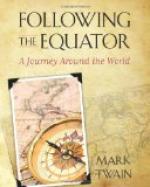He would have to drop out the chief characters; the public would say such people are impossible. He would have to drop out a number of the most picturesque incidents; the public would say such things could never happen. And yet the chief characters did exist, and the incidents did happen.
It cost the Tichborne estates $400,000 to unmask the Claimant and drive him out; and even after the exposure multitudes of Englishmen still believed in him. It cost the British Government another $400,000 to convict him of perjury; and after the conviction the same old multitudes still believed in him; and among these believers were many educated and intelligent men; and some of them had personally known the real Sir Roger. The Claimant was sentenced to 14 years’ imprisonment. When he got out of prison he went to New York and kept a whisky saloon in the Bowery for a time, then disappeared from view.
He always claimed to be Sir Roger Tichborne until death called for him. This was but a few months ago—not very much short of a generation since he left Wagga-Wagga to go and possess himself of his estates. On his death-bed he yielded up his secret, and confessed in writing that he was only Arthur Orton of Wapping, able seaman and butcher—that and nothing more. But it is scarcely to be doubted that there are people whom even his dying confession will not convince. The old habit of assimilating incredibilities must have made strong food a necessity in their case; a weaker article would probably disagree with them.
I was in London when the Claimant stood his trial for perjury. I attended one of his showy evenings in the sumptuous quarters provided for him from the purses of his adherents and well-wishers. He was in evening dress, and I thought him a rather fine and stately creature. There were about twenty-five gentlemen present; educated men, men moving in good society, none of them commonplace; some of them were men of distinction, none of them were obscurities. They were his cordial friends and admirers. It was “Sir Roger,” always “Sir Roger,” on all hands; no one withheld the title, all turned it from the tongue with unction, and as if it tasted good.
For many years I had had a mystery in stock. Melbourne, and only Melbourne, could unriddle it for me. In 1873 I arrived in London with my wife and young child, and presently received a note from Naples signed by a name not familiar to me. It was not Bascom, and it was not Henry; but I will call it Henry Bascom for convenience’s sake. This note, of about six lines, was written on a strip of white paper whose end-edges were ragged. I came to be familiar with those strips in later years. Their size and pattern were always the same. Their contents were usually to the same effect: would I and mine come to the writer’s country-place in England on such and such a date, by such and such a train, and stay twelve days and depart by such and such a train at the end of the specified time? A carriage would meet us at the station.




